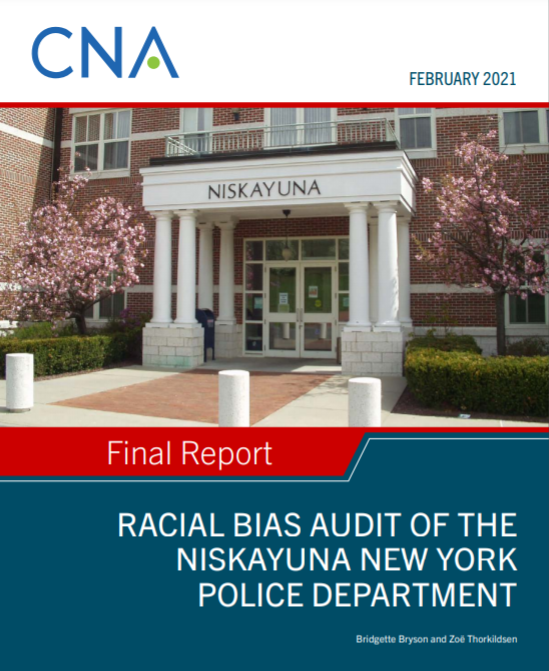Law enforcement agencies across the country continuously face challenges due to the ever-changing nature of policing, especially with recent events including the deaths of George Floyd and Breonna Taylor. These recent events have called into question the objectivity and fairness of policing practices. These developments signal a need for strengthened police-community relations, and the Town of Niskayuna, New York, and the Niskayuna Police Department (NPD) are working hard to ensure their community has positive relationships with their police department. This audit provides baseline information to inform the Town of Niskayuna’s response to Governor Andrew M. Cuomo’s Executive Order No. 203: New York State Police Reform and Reinvention Collaborative.1 In December of 2020, the Town of Niskayuna developed a contract with CNA’s Center for Justice Research and Innovation to conduct a racial bias audit of the NPD. This assessment focused on policies and practices, while also touching on more than racial matters. These types of assessments can help police departments gauge the status of community relationships and work towards improvement. CNA designed this racial bias audit to accomplish the following:
- Assess NPD’s internal operations, policies, and procedures to detect the presence of implicit bias and systemic racial bias.
- Collect and analyze data related to traffic stops, use of force, and other police officer/civilian interactions to determine disparate outcomes for Black and Brown community members.
- Assess compliance with existing police reform policies initiated by NPD.
- Provide actionable recommendations (e.g., realistic within legal, budgetary, and organizational constraints) for reforms that reduce or eliminate racial and implicit biases in policing deployments, strategies, policies, procedures, and practices. These recommendations focus on specific, measurable issues. Such recommendations must meet the following requirements:
- Promote community engagement, transparency, professionalism, accountability, community inclusion, fairness, effectiveness, and public trust;
- Be guided by evidence-based best practices and community expectations; and
- Are likely, given meaningful organizational support, to reduce or eliminate racial and implicit biases in policing deployments, strategies, policies, procedures and practices.
Based on CNA’s review of policies, procedures, and practices, as well as data provided by the NPD, our key findings included the following:
- NPD’s traffic stops data collection process should be refined to help the department further understand its activity for all outcomes and why the activities may look different over time.
- NPD lacks body-worn cameras (BWCs) for its officers and should obtain funding to outfit all officers, patrol officers at a minimum, with the cameras.
- NPD’s complaint process is not clearly written and is poorly understood by officers and community members. NPD should clarify the process and structure it to be open and transparent.
- Currently, there is no disciplinary matrix in place to make certain that officers receive equitable discipline outcomes, to ensure there are no disparities among discipline across race, ethnicity, and gender.
- NPD does not utilize an early intervention system to identify behavioral issues, signs of job exhaustion, and training concerns that could be handled in a proactive manner before an issue arises.
- NPD’s newly revised use of force policy is a very clear and detailed policy that defines when different types of force are justified.
- Currently, there is no formal tracking system for use of force incidents other than the department’s paper filing system. Creating a database to track these incidents will allow the department to begin developing annual summary reports of all use of force in the department.
- NPD currently does not have a strong commitment to community policing practices; however, personnel are very interested and open to working to employ proactive policing strategies, as opposed to reactive.
- NPD does not have designated personnel that oversee the department’s community engagement efforts; however, this has not weakened the trusting relationship expressed by community members and NPD officers.
- NPD personnel have not received sufficient training in the past; however, the new administration is prioritizing training for all officers in various topic areas.
- There are no formal recruitment plans in place, especially for people of color, women, and youth in the community.
- NPD personnel lack trust in the promotion and specialty assignment process.
- NPD does not have a performance evaluation process in place; not all officers receive informal feedback on their performance.
Over the next 12 to 18 months, NPD will work with the Town of Niskayuna officials and community leaders to digest, prioritize, and implement the recommendations proposed in this report, reflecting its dedication to improving community trust, eliminating racial disparities and bias, providing more transparency, and creating a collaborative working environment. We recommend that the NPD and the Town of Niskayuna seek an independent firm to help implement the proposed recommendations and track NPD’s progress.
Download reportDistribution unlimited.
Details
- Pages: 88
- Document Number: IRM-2020-U-028800-Final
- Publication Date: 2/1/2021
